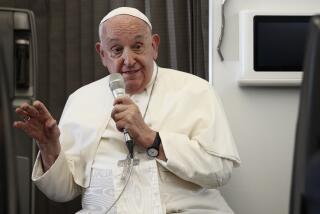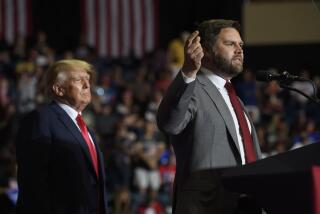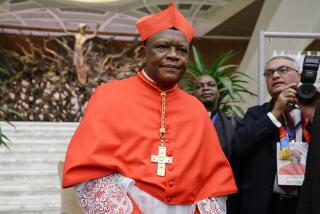Catholic Bishops Refuse to Bend Principles for Politics : Policy: In pre-election-year statement, U.S. church leaders reject positions by the major parties and interest groups on abortion, welfare reform.
- Share via
NEW YORK — Leaders of the nation’s largest church declared their independence Saturday in the 1996 presidential elections, welcoming allies in their fight against abortion but challenging conservatives on welfare reform, capital punishment and immigration.
U.S. Catholic bishops, whose flocks have been courted in recent months by the Catholic Alliance, an offshoot of the conservative Christian Coalition, declared they are not beholden to any political party or interest group.
“We stand with the unborn and the undocumented when many politicians seem to be abandoning them. We defend children in the womb and on welfare. We oppose the violence of abortion and the vengeance of capital punishment. We oppose assault weapons in our streets and condoms in our schools,” the bishops said in their quadrennial statement on political responsibility, released a year before the 1996 vote.
“Political Responsibility: Proclaiming the Gospel of Life, Protecting the Least Among Us, and Pursuing the Common Good” was approved by the 50-member Administrative Board of the United States Catholic Conference. The bishops have issued a statement on religion and politics before every presidential election since the mid-1970s.
The Catholic vote is considered particularly important in next year’s election. Political observers say white Catholics, who have crossed over party lines to vote for Republican presidents but remained supportive of Democratic congressional candidates, have been a key constituency in maintaining split-party government in the United States.
In 1994, for the first time in more than a century and a half, a majority of white Catholics voted for a Republican Congress.
In 1996, Republicans can likely count on receiving a majority of white Protestant votes, and Democrats will likely win support again from black, Jewish and secular constituencies, political analysts say.
That leaves white Catholics.
“Whichever way they flow, to some extent, determines the election,” said Alan Hertzke, a political science professor at the University of Oklahoma and the author of “Representing God in Washington.” “They are the quintessential swing voters.”
John Green, a professor at the University of Akron in Ohio and a leading analyst of religious voting patterns, said Democrats need the white Catholic vote in ’96.
“If I were advising the Clinton White House, which I’m not, I’d say: ‘You guys need to pay attention to the Catholic vote. . . . You really need that, because you’re going to have real trouble with white Protestants,” Green said.
In their statement, the bishops said the church’s role is not to endorse candidates but to analyze issues for their social and moral dimensions and to participate in public policy debates.
At the local level, the bishops encourage churches to promote voter registration, nonpartisan candidate forums and questionnaires on issues from abortion to peace.
“The challenge for our church is to be principled without being ideological, to be political without being partisan, to be civil without being soft, to be involved without being used,” the bishops said.
In setting out their agenda, the bishops distanced themselves from both parties.
For example, the bishops said they would work with a variety of groups to defend the poor and seek greater economic justice but would stand apart on the issue of abortion, which church leaders called the fundamental human rights issue facing the nation.
“We ask some of those who claim to stand for the weak why they protect the eggs of endangered species but fail to defend the lives of unborn children,” they said.
Similarly, the bishops said that while they stand with a variety of groups to defend the family, “we also insist that a test of public advocacy is how public policies touch the poor and the weak.”
The bishops specifically oppose GOP proposals to cap welfare benefits for unwed mothers.
John Carr, secretary of the Catholic conference’s Social Development and World Peace Office, said the bishops felt their statement this year carried a greater sense of urgency because of the polarization and cynicism surrounding politics today.
More to Read
Sign up for Essential California
The most important California stories and recommendations in your inbox every morning.
You may occasionally receive promotional content from the Los Angeles Times.










